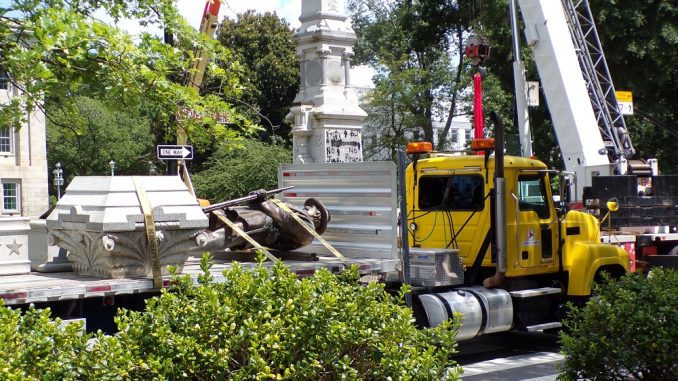
RALEIGH — Over the weekend, Gov. Roy Cooper said his decision to remove certain Confederate monuments from the Capitol area grounds was due to a 2015 law passed by the state’s legislature.
“I have ordered the Confederate monuments on the Capitol grounds be moved to protect public safety,” Cooper tweeted on Saturday. The accompanying press release also pointed to an almost three-year-old article he published on Medium about removal of the monuments.
The 2015 law, the Historic Artifact Management and Patriotism Act, was passed unanimously by the N.C. Senate and by a wide, but mainly partisan, margin in the N.C. House. Two Democrats voted for the bill: Reps. Bill Brisson (Bladen) and Ken Waddell (Columbus). In October 2017, Brisson changed his party affiliation from Democrat to Republican. The law was signed on the same day it was presented to former Republican Gov. Pat McCrory, who weighed in on Cooper’s recent statement.
“I never received a call or letter that I recall from then AG expressing opposition or concern before I signed bill,” tweeted McCrory, referencing that Cooper was attorney general at the time. In part of another tweet, McCrory asked, “What is next statue gov will take down in fear of left wing mob? George Washington?”
The 2015 law states: “If the relocation is permanent, it must be relocated to a site of similar prominence, honor, visibility, availability, and access that are within the boundaries of the jurisdiction from which it was relocated.”
That relocation hinges on being approved by the state Historical Commission, however the commission failed to act and its monument relocation study committee last met in 2018.
Of the 11 members currently serving on the Historical Commission, three are holdovers from the former McCrory administration and seven were appointed by Cooper. The other member, Dr. Mary Lynn Bryan, was originally appointed by former Gov. Mike Easley in 2005 and was reappointed by Cooper on in 2017.
In December 2017, Cooper named David Ruffin, who is in favor of removing Confederate monuments, as chair of the five-member N.C. Historical Commission’s Confederate Monuments Study Committee (CMSC). Coincidentally, Ruffin is a descendant of Edmund Ruffin, a Confederate soldier and secessionist who is often credited with firing the first shot of the Civil War at Fort Sumter and famously committed suicide when the South lost, choosing death over, in his words, “Yankee rule.”
The CMSC’s other four members are Sam Dixon, Dr. Chris Fonvielle, Dr. Valerie Johnson and Noah Reynolds.
The CMSC appears to have met just five times, all in 2018, and last met on Aug. 22, 2018, putting forth three motions regarding three Confederate statues the Historical Commission expressed concern about the year before. In the Sept. 22, 2017, the Historical Commission held off on making a decision to relocate the three monuments — the Confederate Women’s Monument, Confederate Soldiers Monument, and the Henry Lawson Wyatt Monument — from the State Capitol grounds to the Bentonville Battlefield State Historic Site in Four Oaks. Less than three months later, Cooper formed the CMSC.
None of the CMSC’s three August 2018 resolutions offered a path forward but instead lamented the state statute for delays.
The second resolution said the state law limited the committee’s action because it requires that statues be relocated to a similar area of prominence.
The third resolution proposed adding plaques for context and suggested the Department of Cultural Resources should raise funds for erecting new monuments on Capitol Square to “memorialize the accomplishments and contributions of North Carolina’s African Americans.”
It is unclear if the fundraising was ever followed through on by Cooper’s Historical Commission, however lawmakers had been considering funding for African American monuments. The Senate voted last week to allot $4 million for the new monuments, and a bill in the House called for various building projects that would add upward of $200 million. The House Appropriations committee was set to take it up Monday, but both the Senate and the House are now pausing those efforts.
Crews have spent several days attempting to remove obelisk from the 75-foot Confederate monument that was one of the targets of Juneteenth protesters.



